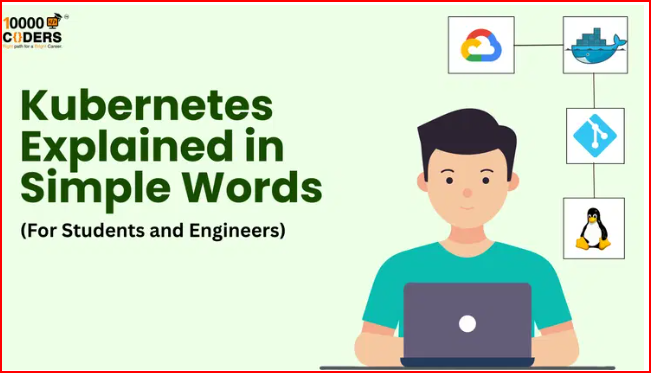Kubernetes Explained in Simple Words
Kubernetes (K8s) is a powerful container orchestration platform that has become the de facto standard for managing containerized applications. Let's break down this complex technology into simple, understandable concepts.
What is Kubernetes?
Kubernetes is like a smart manager for your containerized applications. It helps you:
- Deploy applications consistently
- Scale them up or down as needed
- Manage updates and rollbacks
- Ensure high availability
- Handle networking and storage
Core Concepts Made Simple
1. Pods
Think of a Pod as a single unit that can run one or more containers. It's like a small, isolated environment where your application lives.
apiVersion: v1
kind: Pod
metadata:
name: my-app
spec:
containers:
- name: web
image: nginx:latest
ports:
- containerPort: 80
2. Deployments
Deployments manage multiple identical Pods. They ensure your application is always running with the desired number of replicas.
apiVersion: apps/v1
kind: Deployment
metadata:
name: my-app
spec:
replicas: 3
selector:
matchLabels:
app: my-app
template:
metadata:
labels:
app: my-app
spec:
containers:
- name: web
image: nginx:latest
3. Services
Services provide a stable way to access your Pods. They're like a receptionist that knows where to direct traffic.
apiVersion: v1
kind: Service
metadata:
name: my-app-service
spec:
selector:
app: my-app
ports:
- port: 80
targetPort: 80
type: LoadBalancer
Common Use Cases
1. Running a Web Application
# Deployment
apiVersion: apps/v1
kind: Deployment
metadata:
name: web-app
spec:
replicas: 3
template:
spec:
containers:
- name: web
image: my-web-app:1.0
ports:
- containerPort: 8080
---
# Service
apiVersion: v1
kind: Service
metadata:
name: web-app-service
spec:
type: LoadBalancer
ports:
- port: 80
targetPort: 8080
selector:
app: web-app
2. Database with Persistent Storage
# Persistent Volume Claim
apiVersion: v1
kind: PersistentVolumeClaim
metadata:
name: db-pvc
spec:
accessModes:
- ReadWriteOnce
resources:
requests:
storage: 1Gi
---
# Database Deployment
apiVersion: apps/v1
kind: Deployment
metadata:
name: database
spec:
template:
spec:
containers:
- name: db
image: postgres:13
volumeMounts:
- name: db-storage
mountPath: /var/lib/postgresql/data
volumes:
- name: db-storage
persistentVolumeClaim:
claimName: db-pvc
Key Features Explained
- Scaling
- Horizontal scaling (more Pods)
- Vertical scaling (more resources)
- Automatic scaling based on metrics
- High Availability
- Pod distribution across nodes
- Automatic failover
- Health checks and self-healing
- Updates and Rollbacks
- Rolling updates
- Version control
- Easy rollback to previous versions
Getting Started
1. Local Development
# Install Minikube
curl -LO https://storage.googleapis.com/minikube/releases/latest/minikube-linux-amd64
sudo install minikube-linux-amd64 /usr/local/bin/minikube
# Start Minikube
minikube start
# Deploy an application
kubectl apply -f my-app.yaml
2. Basic Commands
# Get Pods
kubectl get pods
# Get Deployments
kubectl get deployments
# Get Services
kubectl get services
<MeetMentor />
# Describe a resource
kubectl describe pod my-pod
Best Practices
- Resource Management
- Set resource limits
- Use resource requests
- Monitor resource usage
- Implement autoscaling
- Security
- Use namespaces
- Implement RBAC
- Secure secrets
- Regular updates
- Monitoring
- Use Prometheus
- Implement logging
- Set up alerts
- Track metrics
Common Challenges
- Complexity
- Start small
- Use managed services
- Follow best practices
- Learn gradually
- Networking
- Understand services
- Configure ingress
- Manage DNS
- Handle load balancing
- Storage
- Choose right storage class
- Manage volumes
- Handle backups
- Plan for scaling
Conclusion
Kubernetes might seem complex at first, but it's a powerful tool that becomes more intuitive as you use it. Start with basic concepts, practice with simple applications, and gradually explore more advanced features.
Remember:
- Start small and scale up
- Use managed services when possible
- Follow best practices
- Keep learning and experimenting
By understanding these fundamentals, you'll be well-equipped to work with Kubernetes and manage containerized applications effectively.
🚀 Ready to kickstart your tech career?





Comments